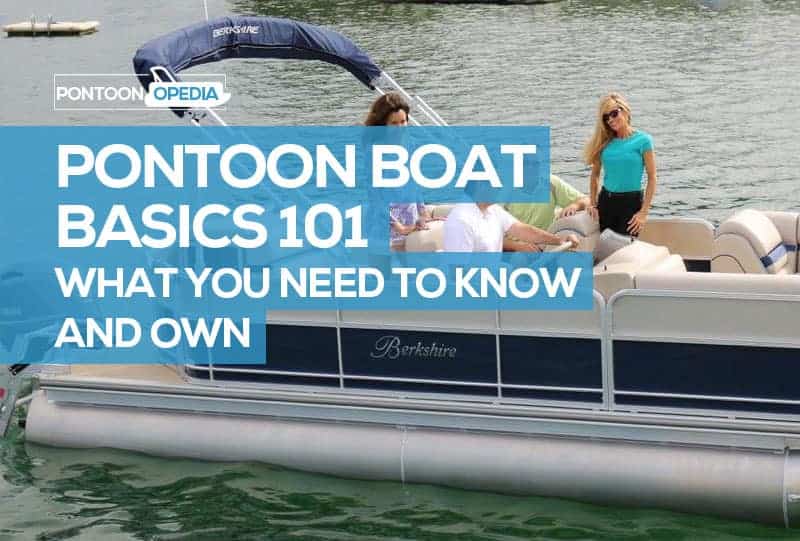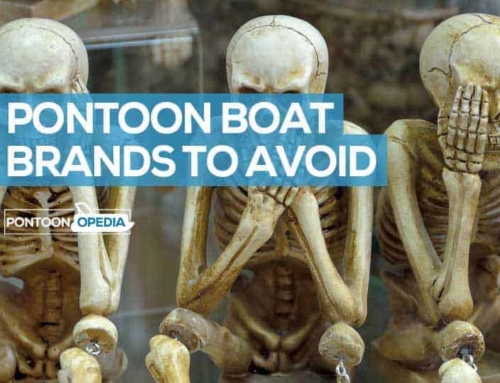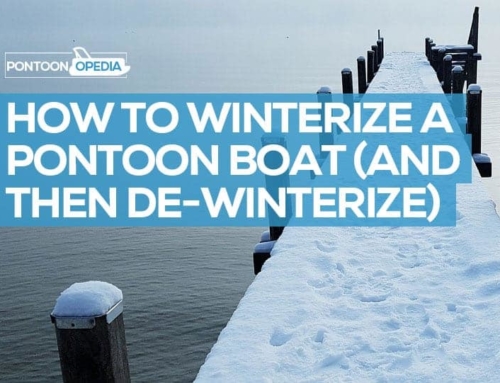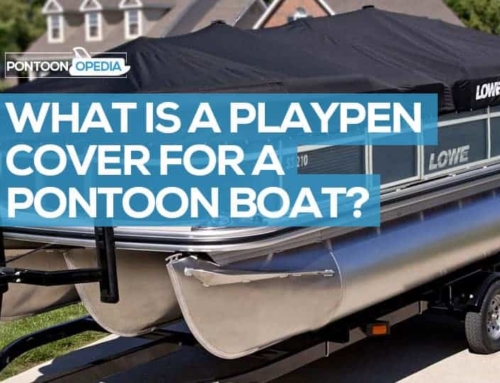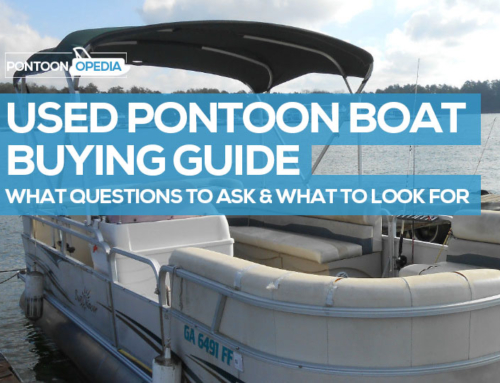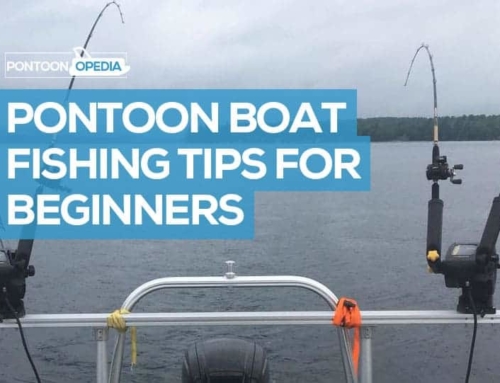Heading out onto the lake in a pontoon boat is one of life’s best pleasures. As far as a fun recreational activity goes, it really can’t be beat.
However, if you aren’t prepared or don’t have the equipment, it could be far more stressful than it should be.
A lack of preparation for unforeseen events can turn a fun boating adventure into an emergency situation.
But don’t let me put you off.
Pontoon boats are amongst the easiest vessels to skipper, and even if you’ve never operated a boat before, after just a few minutes you should be able to get to grips with it.
Over the last few years I’ve put together hundreds of guide and pontoon boat basics, all of which you can find by using the search function in the side bar, or down at the bottom of the website.
However, I thought it was high time that I put all the basic guides into a quick and easy format, so you can dive straight in and get started.
Before you get into that though, I would recommend that you familiarize yourself with my A-Z of pontoon boating terms, as this will be the perfect primer for any beginner just starting out with this type of craft. It will give you a massive head-start on what some of the words used on the website mean.
Pontoon Boat Operating Basics
What follows are some shortcuts into the most popular tips I’ve published on how to operate a pontoon boat, safety advice, and also details on the help in finding the most important equipment for safe boating fun.
Passenger Loads
It’s true that pontoon boats hold more weight than other smaller boats, but the weight distribution has a big effect on the stability of the boat.
Manufacturers ensure that their published maximum weight limits are true, but they don’t account for how you are loading your boat. To make sure your boat is stable, distribute all of your gear evenly.
Be mindful of how many passengers you can have onboard at any one time.
Launching Basics
I wouldn’t recommend you attempt to launch a pontoon boat by yourself until you are very experienced. It’s a two or three-person job at the very least!
Pontoon boats launch very differently to traditional V-shaped hull boats, and you can see how simple it is by reading this 5-step launch guide.
That will show you how to prepare your boat and trailer, how to back up into the water and then the final release into the lake.
Driving Basics
If you can drive a car, you can drive a pontoon boat. Honestly.
The first time you do it there are bound to be nerves, but within minutes I guarantee you will be wondering what all the fuss was about.
To find out just how easy it is, take a look at this extensive overview of how to drive a pontoon boat, including setting off, backing up, and returning to dock again.
Beaching and Anchoring
One of our favorite past-times is finding a quiet beach and pulling onto it for a spot of lunch and the occasional overnight camping trip.
Beaching a pontoon boat needn’t be hard, and in fact it’s relatively simple.
The part you must never forget though is securing your boat properly to keep not just the pontoon safe, but also your passengers and other boaters.
Parking in a Slip or Marina
Coming back into dock was one of the aspects to pontooning that I found the toughest to master, and even the most experienced captains will still get it wrong occasionally.
There is certainly an art to getting your angles right and reacting to the wind and currents for the perfect park. Here are some guidelines and tips you should make notes from or print off.
Rules and Safety Signals
Any responsible skipper should know the basic rules of the waterways, including what signals you should make in case of emergency.
It’s not just about you knowing when to use them, but also essential for you to understand should another boat be in trouble or need to send a warning.
Motor Problems
And lastly in the basic driving tips, what should you do if your motor won’t start?
I’ve compiled 13 tips you will need to check against, which hopefully will be enough in the case of a motor failure.
Pontoon Boat Safety Basics
Boaters are aware of the fact that once they set out to sea, anything can happen. Their level of preparation could determine the outcome of any unexpected emergency.
Here are some safety items that you are legally required to carry in some states, plus some that I personally think should be law even if they aren’t.
Pontoon boat dealers want their customers to stay safe, and most offer optional safety equipment. Like fishing pontoon boats need rod holders, every pontoon boat must have the following equipment:
Alternative Power
There’s an array of problems that can cause your engine to malfunction, so you should be prepared. If it happens, you’ll need to have an alternative source of power to get your pontoon boat back to shore.
Carrying a spare outboard on deck is unrealistic, so be sure to have oars along for the ride. These could make all the difference if your engine ceases to operate.
First Aid Kits
It’s hopefully rare, but accidents can happen. Having a proper first aid kit will help you treat the wounded or could even save a life. Prepare for anything and don’t overlook the simple things including motion sickness pills and 30 SPF sunscreen.
In the event of a fire, you absolutely need to be prepared with the right fire extinguisher. If you’re not sure, talk to your pontoon boat dealers. Be vigilant, and get it recharged if it expires.
Don’t just stop at a first aid kit though, other items you will need on your pontoon boat can be found in my guide to pontoon boat safety equipment.
Life Jackets
When cruising the lake with a group of people, it’s not easy to determine who can swim and who can’t. Bring enough lifejackets for everyone on the boat!
Pontoon boats have a lot of storage space to hold the jackets when they’re not being used. Wetsuits can keep people warm if they’re in the water for a long period of time.
But it’s not just life jackets you will need. Here are 13 essential items every pontoon owner should always carry onboard.
Tool Kits
Heaven forbid you need to make repair whilst on the water, but if you do, it pays to be prepared with some must-have marine tools.
Boating with Kids
I’ve got kids myself and 90% of our pontoon trips involve children.
The sooner you can get them used to boating the better as it’s a life skill that will set them up for life.
You might also want to tow your kids in an inflatable tube.
Pontoon Boat Trailer Basics
Unless your pontoon boat is stored at a marina or dock, you will need to learn the basics of pontoon boat trailering. You might even have to pick your new boat up straight from an inland dealer, so will need to know how to get her home safely.
Towing Basics
Towing takes some getting used to, and aside from the safety factors there are other considerations such as insurance and how much towing power your vehicle will need.
Read my 16 tips on towing basics including how to prepare, how to drive, how to handle and even some advice on breakdown cover.
And if you weren’t aware, towing speed limits can differ depending on what US state you are pulling your boat in. Click here to see what the towing speed limit is where you live.
Basic Trailering Tips
Getting your pontoon boat out of the water won’t be perfect the first time you try it. In fact, I’d hazard a guess and say you might have to do it 10 times before you reach peak perfection.
It certainly took me that long!
Find out how you can soon master this (allegedly) basic pontoon trailering task in this guide to getting your boat of out the water.
Stopping Your Boat (and Trailer) from Being Stolen
It’s a sad fact of life that thieves will see your expensive pontoon boat and trailer and soon be thinking about ways in which they can take them off your hands.
Thankfully mine has never been stolen, but I wouldn’t be surprised if some scumbag has thought about doing it – but they won’t get far as mine is locked down securely!
Find out how you can do the same with my tips on securing a boat trailer from theft.
Pontoon Boat Fishing Basics
When I’m not with my family or entertaining, I’m out fishing either alone or with some buddies. Here is a short selection of my advice on how you can get the most from your pontoon boat if fishing is your thing.
Basic Fishing Tips for Beginners
Just because you have never fished before, it doesn’t mean it’s too late to start. Pontoon boats are ideal for this hobby, and with just a few basic accessories and pieces of equipment you can get started.
Read my 11 tips on fishing basics including how you should set-up your pontoon, what you need, where to sit, and then some advice on how you can grill up your catch.
Boat Set-Up and Layouts
How you set your boat up and the seating configuration can make a huge difference on how successful your day’s fishing is.
In this guide to fishing layouts you can see photos of what some of the best pontoon boat fishermen (and women) use when going out on the lakes.
Fishing Basics You Will Need
Before you even think about your boat’s layout, you should invest in the right fishing accessories.
This can range from fishing rod holders, to livewells, trolling motor, rod storage and loads more.
Here’s what I recommend with my reviews of the best-rated pontoon fishing accessories that money can buy.
Use a Fish Finder
Nothing is worse than waking up all excited about a day’s fishing, only to return empty handed.
Don’t waste time second guessing where the fish will be, and instead invest in a fish finder.
Once you have it, how to do you install it? Click here for a quick installation guide.
The Last Word
If you are still thinking about buying a pontoon boat, I would recommend that you read my buyer’s guide.
You can also take a look at my master list of pontoon boat accessories I recommend for beginners, but more importantly, guides to the very best equipment I have personally rated and reviewed – those are available in my pontoon gear page.
To summarize, a little extra preparation can go a long way in assuring a successful boating adventure – I hope that these pontoon boat basics have helped you and I wish you all the best with your future pontooning!

